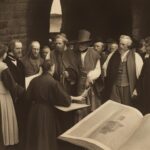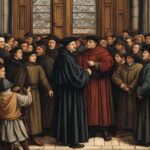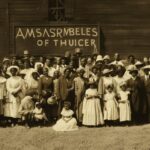The Lutheran Church, with its rich history and deep-rooted faith, holds a prominent place within the Christian community. Founded by Martin Luther in the early 16th century, this denomination has grown to become the largest Protestant branch worldwide, boasting over 60 million members.
Lutheranism rapidly spread throughout Germany and Scandinavia, eventually finding its way to the Georgia colony in the early 18th century. At the heart of Luther’s teachings lies the central doctrine of “Justification through Faith,” which emphasizes salvation through faith in God’s grace rather than reliance on good works.
The Lutheran Church believes that the teachings of Martin Luther are faithfully preserved in the Book of Concord, a collection of confessions and doctrinal statements that guide their followers.
Key Takeaways:
- The Lutheran Church was founded by Martin Luther in the early 16th century and is the largest Protestant denomination with over 60 million members.
- Lutheranism spread throughout Germany, Scandinavia, and even reached the Georgia colony in the early 18th century.
- Lutheran doctrine emphasizes “Justification through Faith,” focusing on salvation through faith in God’s grace rather than good works.
- The teachings of Martin Luther are preserved in the Book of Concord, which serves as a guide for Lutheran beliefs and practices.
- Despite challenges and changes over time, the Lutheran Church remains committed to its core beliefs while adapting to the modern world.
Beliefs and Doctrines
Lutheranism is rooted in the belief that salvation is attained through faith in God’s grace, rather than through good works. This central teaching, known as “Justification through Faith,” is foundational to the Lutheran faith. Lutherans put their trust in God’s unwavering love and believe that they are justified and saved solely by their faith in Him.
At the core of Lutheran beliefs is the recognition of the Holy Trinity, consisting of God the Father, Jesus Christ the Son, and the Holy Spirit. Lutherans affirm the divinity of Jesus Christ and acknowledge Him as the Son of God who came to redeem humanity through His sacrifice on the cross.
The Lutheran denomination places great importance on Scripture as the Word of God. Lutherans believe that the Bible contains all necessary teachings for salvation and serves as the ultimate authority for their faith and practice. It is through Scripture that Lutherans gain a deeper understanding of God’s will and discover His plan for their lives.

“Scripture alone shall establish articles of faith and church criticism, and no one else, not even an angel.” – Martin Luther
Lutherans recognize Baptism and Holy Communion as sacraments that hold great significance in their faith. Baptism, usually performed in infancy, is seen as a means of grace through which believers are cleansed of original sin and welcomed into the Christian community. Holy Communion, also known as the Lord’s Supper or Eucharist, is believed to be the true body and blood of Christ present in the bread and wine. Through partaking in Communion, Lutherans receive spiritual nourishment and the forgiveness of sins.
The Augsburg Confession, presented in 1530, articulates the twenty-eight articles that serve as the basis of Lutheran beliefs. This confession outlines the key points of Lutheran doctrine, including the topics of God, the Trinity, justification, sacraments, and the Church. These articles affirm the Lutheran understanding of faith, grace, and the means by which believers receive God’s salvation.
| Lutheran Beliefs | Key Doctrines |
|---|---|
| Justification through Faith | Salvation is attained through faith in God’s grace, not by good works. |
| Trinity | Belief in the Holy Trinity: God the Father, Jesus Christ the Son, and the Holy Spirit. |
| Scripture | The Bible is the authoritative Word of God and the ultimate source of teachings for salvation. |
| Baptism | Baptism is a sacrament that cleanses believers of original sin and initiates them into the Christian community. |
| Holy Communion | The true body and blood of Christ are present in the bread and wine of Holy Communion. |
Sacraments and Rituals
In the Lutheran Church, sacraments and rituals hold deep significance in the worship experience, nurturing the spiritual growth and connection to God. These practices are rooted in the rich traditions and teachings of the Lutheran denomination.
Baptism: A Cleansing and Welcoming
The first sacrament recognized by Lutherans is Baptism. It is viewed as a means of grace through which believers are cleansed of sin, united with Christ, and welcomed into the Christian community. Baptism is a sacred moment, symbolizing rebirth and the beginning of a lifelong journey of faith.
Holy Communion: The True Body and Blood of Christ
Another essential sacrament is Holy Communion, also known as the Eucharist or the Lord’s Supper. Lutherans believe that during this sacrament, the bread and wine become the true body and blood of Christ. By receiving Communion with faith, believers receive forgiveness of sins and are nourished spiritually.
Confirmation, Marriage, and Funerals: Rituals of Transition
In addition to the sacraments, Lutherans also practice various rituals that mark important transitions in life. Confirmation, often taking place during adolescence, affirms the individual’s faith and commitment to the Christian life. Marriage is a sacred covenant, witnessed by God and the community, while funerals provide an opportunity to honor the life of a loved one and offer comfort to those who mourn.
Reverence and Symbolism
Throughout these sacraments and rituals, Lutherans emphasize reverence and symbolism. Each action, gesture, and word carries deep meaning, inviting the worshipper to engage on a spiritual level. Whether it is the pouring of water in Baptism, the breaking of bread in Holy Communion, or the exchanging of vows in marriage, these rituals serve as transformative moments that deepen faith and strengthen the connection to God and the Lutheran community.
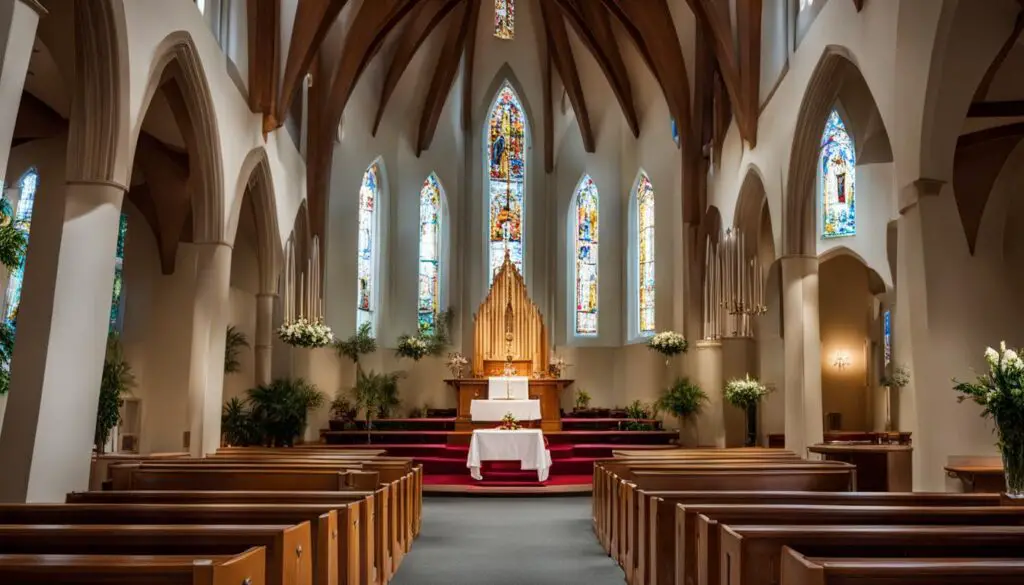
| Sacraments and Rituals | Description |
|---|---|
| Baptism | A means of grace, cleansing believers of sin and welcoming them into the Christian community. |
| Holy Communion | The true body and blood of Christ, received by faith for the forgiveness of sins. |
| Confirmation | A ritual that affirms faith and commitment to the Christian life. |
| Marriage | A sacred covenant witnessed by God and the community, uniting two individuals in love and partnership. |
| Funerals | Rituals that honor the life of a deceased individual and offer comfort to those who mourn. |
Leadership and Clergy
In the Lutheran Church, leadership and clergy play a vital role in guiding and shepherding congregations. Pastors, ordained and equipped with theological training, serve as spiritual leaders who preach the Word of God, administer sacraments, and provide pastoral care. Their dedication and commitment to the Lutheran faith inspire and guide the community.
Under the hierarchical structure of the church, pastors work in coordination with bishops, synods, and other governing bodies that oversee and support the spiritual and administrative affairs of the denomination. These leaders are responsible for maintaining the unity and integrity of the Lutheran faith while addressing the needs of the congregations they serve.
Lay leaders, in addition to pastors, are an integral part of the Lutheran community. They contribute their skills, talents, and time to assist pastors in various aspects of church life, including worship services, education programs, outreach initiatives, and community engagement. Their active involvement strengthens the sense of belonging and fosters a collaborative environment within the Lutheran congregation.
The Lutheran Church recognizes the importance of well-trained clergy and invests in theological education to equip pastors with the knowledge and skills necessary to lead congregations effectively. Through rigorous academic programs and practical training, future clergy members are prepared to serve as compassionate shepherds and provide guidance and support to their communities.
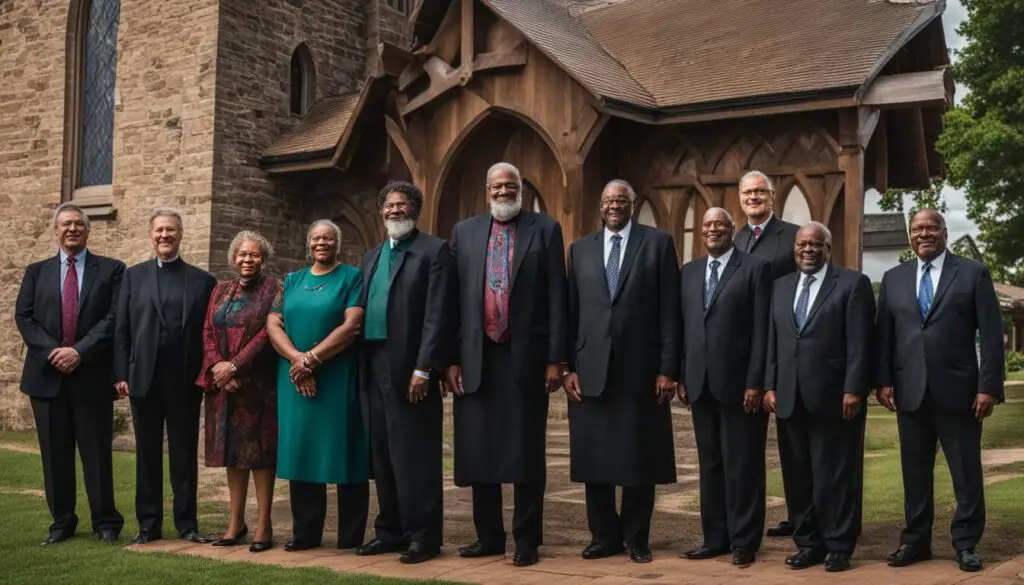
The leadership and clergy of the Lutheran Church embody the values and teachings of the faith, promoting unity, spiritual growth, and a deep connection with God. Their dedication to the Lutheran community ensures the continuation of a vibrant and thriving church that seeks to fulfill its mission of spreading the Gospel and serving others.
Worship Practices
Lutheran worship is a deeply reverent and meaningful experience that revolves around the Word of God and the Sacraments. It is a time for the Lutheran congregation to come together in praise and worship, fostering a sense of community and spiritual growth.
Services typically include a combination of liturgical elements, hymns, readings from Scripture, prayers, and a sermon. The liturgy, rooted in tradition, provides a structure for worship that is familiar to Lutheran congregants and helps to unite them in a shared expression of faith.
The congregation actively participates in the service through responsive readings, where specific passages of Scripture are recited together, affirming their beliefs as a community. This engagement creates a sense of fellowship and unity among the worshippers.
Singing hymns is an integral part of Lutheran worship. Hymns offer a way for the congregation to express their devotion and gratitude to God through music. These hymns often have deep theological messages and are sung with reverence and joy.
“Let the word of Christ dwell in you richly, teaching and admonishing one another in all wisdom, singing psalms and hymns and spiritual songs, with thankfulness in your hearts to God.” (Colossians 3:16)
The Lutheran worship style can vary between traditional and contemporary, depending on the specific congregation and its preferences. Regardless of the style, the focus remains on praising God, receiving His grace through the Sacraments, and growing in faith as a unified body.
Architecture and artistic features play a significant role in Lutheran worship spaces. They often reflect the rich history and traditions of the Lutheran faith, providing a visually engaging environment that enhances the worship experience. These features may include stained glass windows, ornate altars, baptismal fonts, and intricate woodwork.
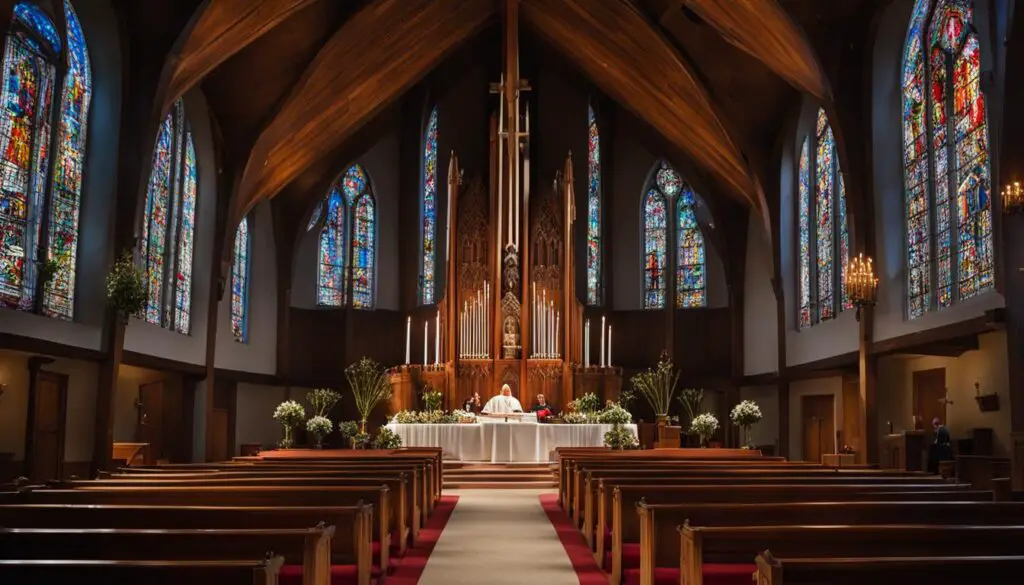
The Lutheran worship service is a sacred time of devotion and communion with God and fellow believers. It offers an opportunity for spiritual nourishment, encouragement, and a deepening of faith within the Lutheran congregation.
Sacred Texts
The Lutheran Church holds the Bible as the sacred text, considering it the inspired and authoritative Word of God. Comprised of the Old Testament and the New Testament, the Bible serves as the foundation for Lutheran doctrine and faith. Lutherans interpret the Scripture through the lens of the Gospel and the teachings of Martin Luther, the church’s founder and influential theologian.
The Book of Concord, published in 1580, is also highly regarded within the Lutheran tradition. It contains the confessions and doctrinal statements that define the Lutheran faith. These statements, such as the Augsburg Confession and the Smalcald Articles, guide the theological principles and practices of the Lutheran Church. The Book of Concord serves as a unifying source of authority for Lutheran congregations and clergy.
Comparison of Sacred Texts in Different Christian Traditions
| Lutheran Church | Catholic Church | Protestant Church |
|---|---|---|
| Emphasizes the Bible as the inspired Word of God. | Accepts the Bible, the teachings of the Church Fathers, and the Magisterium as authoritative. | Interprets the Bible as the primary source of authority. |
| Includes the Old Testament and the New Testament. | Includes the Old Testament and the New Testament, as well as additional books known as the Deuterocanonical books. | Includes the Old Testament and the New Testament, following the Protestant canon. |
| Interprets Scripture through the lens of the Gospel and the teachings of Martin Luther. | Interprets Scripture through the teachings of the Magisterium, inclusively using Tradition, the Church Fathers, and the Pope’s authority. | Emphasizes individual interpretation of Scripture using a range of biblical commentaries and theological resources. |

Denominations and Sects
The Lutheran Church encompasses various denominations and sects that share the core principles of Lutheranism while having slight variations in their beliefs and practices. These different bodies play a crucial role in promoting the Lutheran faith and serving their respective communities.
Some of the prominent Lutheran denominations and sects include:
- The Lutheran Church—Missouri Synod
- Evangelical Lutheran Church in America
- Wisconsin Evangelical Lutheran Synod
- North American Lutheran Church
- Lutheran Congregations in Mission for Christ
- American Association of Lutheran Churches
- Church of the Lutheran Brethren of America
While these denominations may have their unique structures, governance systems, worship styles, and theological emphases, they all share the common foundation of Lutheranism. The diversity within the Lutheran community reflects the dynamic nature of faith and the adaptability of Lutheran teachings across different cultural contexts.
| Denomination / Sect | Year Established | Membership | Headquarters |
|---|---|---|---|
| The Lutheran Church—Missouri Synod | 1847 | About 2 million | Saint Louis, Missouri |
| Evangelical Lutheran Church in America | 1988 | Over 3.3 million | Chicago, Illinois |
| Wisconsin Evangelical Lutheran Synod | 1850 | Over 390,000 | Waukesha, Wisconsin |
| North American Lutheran Church | 2010 | Over 430 congregations | Various |
| Lutheran Congregations in Mission for Christ | 2001 | Over 1,000 congregations | Various |
| American Association of Lutheran Churches | 1987 | Over 50 congregations | Various |
| Church of the Lutheran Brethren of America | 1900 | About 1,500 | Fergus Falls, Minnesota |
Community and Outreach
The Lutheran Church values community and outreach as essential aspects of its faith. Congregations actively engage in a wide range of activities and ministries, centered around serving both their members and the broader community. These endeavors demonstrate the church’s commitment to spreading God’s love and extending help to those in need.
Lutheran congregations organize various social outreach programs, embodying the spirit of compassion and care. These programs aim to address social issues, offer support to marginalized individuals and groups, and make a positive impact on society. Additionally, charity work plays a significant role, as Lutherans believe in the power of generosity and its ability to transform lives.
Youth groups offer young believers a space to grow in their faith, connect with peers facing similar challenges, and actively participate in their community. These groups encourage personal development, foster meaningful relationships, and provide opportunities for leadership and service.
Educational initiatives are also a vital component of Lutheran outreach. This includes establishing schools and educational programs that instill Christian values and principles, creating a nurturing environment for academic excellence and character development.
Lutheran missionary efforts extend the reach of the church beyond local communities. Missionaries, driven by compassion and a desire to share the Gospel, serve in different parts of the world, building relationships, providing aid, and spreading the message of God’s love.
Through community engagement and diverse outreach initiatives, the Lutheran Church seeks to make a positive difference in the world, embodying the teachings of Jesus Christ and inspiring others to do the same.
Contemporary Issues and Challenges
The Lutheran Church, as a longstanding religious institution, faces various contemporary issues and challenges in today’s world. One of the significant challenges is theological debates surrounding interpretation and application of Lutheran teachings in a rapidly changing social and cultural landscape. As society undergoes transformations, the Lutheran Church grapples with reconciling its core beliefs with evolving societal norms.
In addition to theological debates, societal divisions present another challenge for the Lutheran Church. The increasing polarization in society poses difficulties for fostering unity and inclusivity, which are central to Lutheran teachings. Efforts to bridge divides and promote understanding are ongoing as the church seeks to uphold its values of love, compassion, and acceptance.
Furthermore, declining membership in some areas is a pressing concern for the Lutheran Church, as it strives to engage and retain the faithful. This decline may be attributed to several factors, including changing demographics, shifting attitudes towards organized religion, and competition from other religious and secular institutions. The church must adapt its outreach strategies and find innovative ways to connect with individuals seeking spiritual guidance.
Financial sustainability is also an ongoing challenge for the Lutheran Church. As costs rise and resources become limited, congregations face the task of managing their financial resources while ensuring they can continue to provide vital services and support to their members and communities.
FAQ
When was the Lutheran Church founded?
The Lutheran Church was founded in the early 16th century by Martin Luther.
How many members does the Lutheran Church have?
The Lutheran Church is the largest Protestant denomination with over 60 million members.
What is the central doctrine of Lutheranism?
The central doctrine of Lutheranism is “Justification through Faith,” which emphasizes salvation by faith in God’s grace rather than good works.
What are the sacraments recognized by the Lutheran Church?
The Lutheran Church recognizes two sacraments: Baptism and Holy Communion.
What is the role of pastors in the Lutheran Church?
Pastors serve as the spiritual leaders of congregations, preaching, administering sacraments, and providing pastoral care.
What is the worship style in the Lutheran Church?
Lutheran worship is centered around Word and Sacrament and may vary between traditional and contemporary styles.
What is the significance of the Bible in the Lutheran Church?
The Bible is considered the inspired and authoritative Word of God in the Lutheran Church.
Are there different denominations within the Lutheran Church?
Yes, there are various denominations and sects within the Lutheran Church, such as The Lutheran Church—Missouri Synod and Evangelical Lutheran Church in America.
How does the Lutheran Church engage with the community?
The Lutheran Church organizes various activities and ministries to serve its members and the broader community.
What are the contemporary issues faced by the Lutheran Church?
The Lutheran Church faces challenges such as theological debates, societal changes, declining membership in some areas, and financial sustainability.

